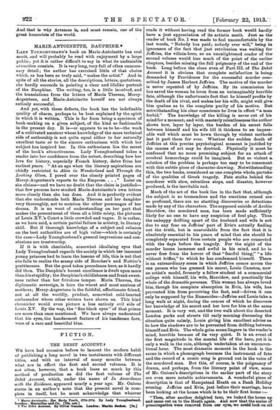MARIE-ANTOINETTE, DAUPHINE.
LADY YOUNGHITSBAND'S book on Marie-Antoinette has real merit, and will probably be read with enjoyment by a large public; yet it is rather difficult to say in what its undeniable attraction consists. It is very long, very full of often unneces- sary detail ; the author has exercised little of that choice which, as has been so truly said, " makes the artist." And in spite of all the stories, all the descriptions, letters, quotations, she hardly succeeds in painting a clear and lifelike portrait of the Dauphine. The writing, too, is a little involved, and the translations from the letters of Maria Theresa, Mercy- Argenteau, and Marie-Antoinette herself are not always entirely successful.
And yet, with these defects, the book has the indefinable quality of charm, perhaps to be best explained by the spirit in which it is written. This is far from being a specimen of book-making on a given subject, of the kind so fashionable in the present day. It is—or appears to us to be—the work of a cultivated amateur whose knowledge of the more technical side of authorship is not quite equal either to her naturally excellent taste or to the sincere enthusiasm with which her subject has inspired her. In this enthusiasm lies the secret of the book's attractiveness. Lady Younghusband takes a reader into her confidence from the outset, describing how her love for history, especially French history, dates from her earliest years. "At an age when the literary aspirations are chiefly restricted to Alice in Wonderland and Through the Looking Glass, I pored over the closely printed pages of Mercy-Argenteau's reports to the Empress. . . ." Later on she claims—and we have no doubt that the claim is justified— that few persons have studied Marie-Antoinette's own letters more closely than she has done. And it is perfectly evident that she understands both Maria Theresa and her daughter very thoroughly, not to mention the other personages of her drama. It is no want of understanding on her part that makes the presentment of them all a little misty, the pictures of Louis XV.'s Court a little crowded and vague. It is rather, as we have said, a certain partial failure in artistry, in literary skill. But if thorough knowledge of a subject and reliance on the best authorities are of high value—which is certainly the case—Lady Younghusband's general impressions and con- elusions are trustworthy.
If it is with charitable, somewhat idealizing eyes that Lady Younghusband regards the society in which her innocent young princess had to learn the lessons of life, this is not that she fails to realize the seamy side of Boucher's and Nattier's prettinesses. But the good takes precedence here, as it hardly did then. The Dauphin's honest excellence is dwelt upon more than his stupidity; the Dauphine's childishness and frank sweet- ness rather than her frivolous temper. Maria Theresa, the diplomatic sovereign, is here the wisest and most anxious of mothers; Mercy-Argenteau is the faithful, affectionate friend, not at all the worldly, prudent, somewhat cold-hearted ambassador whom other writers have shown us. This kind chronicler would even picture a less entirely evil side of Louis XV. By the way, the "fine black eyes " of that prince are more than once mentioned. We have always understood that his eyes, the handsomest feature of his handsome face, were of a rare and beautiful blue.














































 Previous page
Previous page